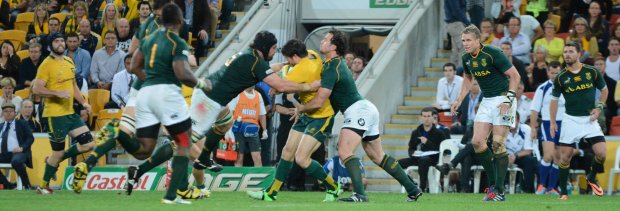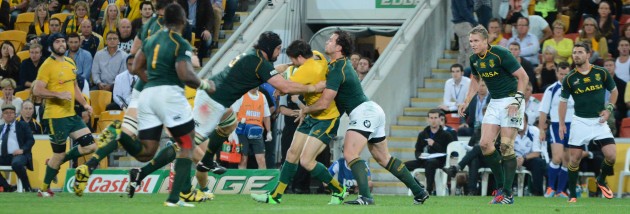First, we were comprehensively beaten. I don’t there’s one part of the game where we weren’t defeated by South Africa. Set play, kicking, attack, defence, skill sets, angles of running. Everything.
On the scoreboard we were in the game for quite a while, but on the park we were well adrift. In the last four games teams have scored 153 points against us. They were good teams but that’s a heck of the lot of points. The try count is 16 to four.
We seem to have absolutely forgotten the fundamentals of rugby – especially in attack. There is a group of ex-rugby players who frequently get together. At that gathering on Saturday night, they were bemoaning the fact that we have a complete lack of authority in the matches we’re playing.
Another comment which I thought was interesting, was that ‘celebrity status seems to have gotten ahead of performance in our team’. Which seems strange as really celebrity status should come as a result of performance. But we don’t have that.
In putting my thoughts together for this article, I can’t help but think I keep repeating myself. I was concerned about that, but then I realised that’s the role of a coach – to keep repeating himself so that the players might pick up on it. To keep working on the same fundamentals of the game in order that they underpin performance.
Before the match Ewen said he wanted to keep the ball moving to overcome some of the advantages that the Springboks had. The comment continued that if we got some ‘width to our game’ that we could play away from some of the South African strengths. Presumeably this says that they are bigger and stronger than we are and so we should move them around the field so that the strength wouldn’t come into play.
Someone else said to me after the game that you have to ‘earn the right to go wide’.
I don’t think you earn the right to go wide or not at all. I think what you do is go forward, and by going forward you give yourself the opportunity to makes space and play into it. If that space is wider than you are, you play into it. If it’s close, then you play narrow into it. So width for me, is not something that you do by intent, but rather as a consequence of what teams do in response to you going forward.
In our case we shifted the ball wide often, but rarely went forward.
It recent weeks I’ve said Genia hasn’t played well. I know it may be sacrilegious, but I now think it may be time to give Will a rest. In the last few games I’ve thought that it was when White and Cooper came on that we played better. But this time round it was clear that actually it was White replacing Genia that has made the difference.
This is clearer now because I thought Cooper was very poor from the start. He took the ball standing still, shuffled sideways and then passed the ball on. If you add that to Will’s sideways/backwards steps, in our first two touches we have no forward movement whatsoever.
For backline play, the fundamental quality is that the halfback moves the ball quickly, smoothly and accurately off the ground. The flyhalf then starts the backline’s movement towards the defence. The second receiver’s role is to continue that movement and add some genuine acceleration.
If you move towards the opposition with acceleration, they have to move towards you – or they leave a space. If they stay where they are, it’s a lot easier to reach the advantage line. If they move sideways they leave a space for you to run into, making your attack even easier.
The aim of the attack therefore is to cause the defence to move parallel to touch, or pay the penalty. Now, once you’ve got the defence moving the parallel to touch you’ve got some opportunity to attack, whether that’s narrow or wide.
Virtually for the whole match, that didn’t happen. In fact the first time I saw the Wallabies attack straight with some shorter passes was in the 71st minute – White passed the ball off the ground and Cooper wasn’t involved. O’Connor made some ground down the right wing and he kicked ahead.
Then in the 72nd minute, White passed the ball to Leali’ifano straight from a lineout and Adam Ashley-Cooper was almost to the line. Again, straight attack (see below).
The other thing that’s vital in attack, is that all opportunity in attack occurs at the ball, wherever it is. When the ball is shifted to another place, the opportunity is now there. We seem to think we need to wait for the ball to come back to us, for us to then make an opportunity
In the 38th minute James O’Connor caught the ball near the right touchline. Genia and Cooper dawdled back. Folau took a pass and sent it to AAC. We then had a great opportunity to the left with Leali’ifano and Cummins. O’Connor didn’t chase the ball he passed, Folau didn’t chase the ball, Genia had no urgency and Cooper positively dawdled!
Had the passers of the ball chased it, when AAC eventually went forward, he stopped the defender in front of him and we had a MASSIVE opportunity down the left.
In the 39th minute, when le Roux went close to scoring and Cooper fielded the ball in goal and threw a long pass, O’Connor cleared the ball from just outside our own tryline, there was another opportunity, albeit riskier. If O’Connor had taken out the second last defender, Leali’ifano could have looped giving Folau an overlap, and if Cooper had have chased we would have had him on the inside as well (see below).
But nobody wants to run at the opposition! Is it any wonder we haven’t scored any tries? If you can’t go past the opposition you can’t score.
I wonder how this can be. What are the coaching staff doing at practice? I’ve suggested for some weeks that Will Genia is playing poorly at scrum half. The role of the coaching staff is to make sure our very good players play very well. To make sure that our outstanding players play outstandingly (you can’t make a silk purse out of a sows ear.)
I’ve been told that Will doesn’t take advice easily. If he doesn’t take advice then the only alternative is to leave him out of the team and at the moment I can’t see any alternative but to do that. At some stage along the line we have to give Nic White an opportunity and what better chance than against Argentina?
After Saturday night it’s clear to me that the problem is Genia and Cooper. Next week I would play White and Toomua. People will say that’s harsh on the halves when we’d been dished up front (which we were), but for many years Australia has struggled with 35-40 per cent of set piece ball, but won.
I can remember a time when we toured NZ in 1982. The night before the team was picked a truckload of the current XV withdrew their availability including six out of the eight forwards and three of the backs. Two subsequent potentials for the XV were also not available.
Now although we didn’t win the three-Test series, we won the second Test on New Zealand soil. What did we do? We chose channel one ball, which put pressure on our halves, but at least we had a chance to attack. The NZ back row therefore had to choose whether to put the focus on the scrum or the ensuing tackle.
Funnily enough, our scrum started to become more competitive.
We played Argentina in 1983 and in the first Test they destroyed us with Topo Rodriguez at tighthead and Dengra at loosehead with the Bajada scrum. We spent the next week focusing on our technique, particularly with front row binding and angles to minimise the opportunity for the Argentinian scrum to overcome us.
None of this appears to be happening now though. Either our coaching staff are not having any effect because the message isn’t getting received, or they don’t know what the message should be.
I don’t think we’re devoid of the basic abilities (pace, acceleration, size, hand-eye coordination), so something has to happen. If the team won’t listen to the coaching staff then either team has to change or the coaching staff – at this time the former makes most sense. My suspicion is though that the staff are loathe to lay down the law on what is accurate technique. Now is the time.



